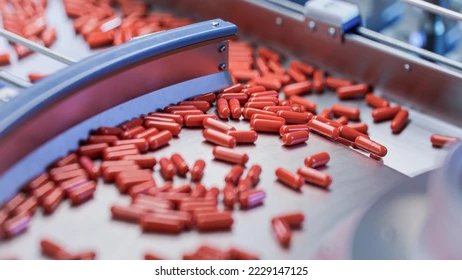Capsule Manufacturing: A Comprehensive Guide to the Process and Benefits
Capsule manufacturing plays a critical role in the pharmaceutical and nutraceutical industries. Capsules are one of the most popular forms of medication and dietary supplements due to their convenience, precision, and ease of use. This article explores the capsule manufacturing process, its benefits, and key considerations when choosing a manufacturing partner.
What is Capsule Manufacturing?
Capsule Manufacturing involves the production of hard or soft gelatin or vegetarian capsules that contain medicines, vitamins, or other health supplements. These capsules are typically designed to be ingested orally, offering a controlled release of the ingredients inside.
The manufacturing process includes filling the capsule shells with active ingredients, using machines that ensure precise dosages. Capsule production is subject to stringent regulatory standards, ensuring consistency, safety, and quality throughout the process.
The Capsule Manufacturing Process
The process of capsule manufacturing can be broken down into several key stages:
Capsule Shell Production
The first step in the process is the creation of the capsule shells. There are two primary types of capsules used in the industry:
Hard Capsules: Composed of two parts, a body and a cap, hard capsules are usually made of gelatin, which provides the shell’s structure.
Soft Capsules: These capsules are made from a single piece and are used for liquids, oils, or pastes. They offer a higher level of containment and can be ideal for substances that are sensitive to moisture.
The materials used in capsule shell production can vary, including animal gelatin and plant-based alternatives such as hydroxypropyl methylcellulose (HPMC), a popular choice for vegan and vegetarian capsules.
Filling Process
Once the capsule shells are produced, the next step is filling them with active ingredients. This is a critical phase, as the dosage must be precise to ensure the efficacy of the product. The filling can be done using powder, liquid, or gel-filled formulations, depending on the type of product being manufactured.
Automated machines are used to fill the capsules efficiently and accurately. This step often includes the addition of excipients, which are inactive ingredients used to stabilize the active ingredients, enhance absorption, or improve the texture of the capsule.
Capsule Sealing
After the capsules are filled, the next step is sealing them to prevent leakage or contamination. Sealing ensures that the contents remain intact and prevents the ingredients from being exposed to moisture or air.
In the case of soft capsules, this is typically done by heat welding the two halves together. For hard capsules, the cap is usually firmly placed on the body to create a sealed, airtight enclosure.
Drying and Hardening
Soft capsules undergo a drying process to solidify the contents and shell, ensuring that the capsule holds its shape and durability. Hard capsules, on the other hand, are subject to a hardening process that makes the shell more robust.
This stage is essential for ensuring that capsules are stable for storage and transportation without risk of breaking, leaking, or losing their integrity.
Quality Control and Inspection
The final stage of capsule manufacturing involves rigorous quality control checks. Each batch is tested for various factors such as:
Weight consistency
Fill uniformity
Shell integrity
Disintegration and dissolution tests
This ensures that the capsules meet industry standards and that the dosage is correct for each product.
Benefits of Capsule Manufacturing
Capsules offer several advantages over other dosage forms, making them a popular choice for both pharmaceutical and nutraceutical products. Some of the key benefits include:
Precise Dosage Control: Capsules are known for their accuracy in delivering the correct dosage, ensuring consistency across each unit.
Convenience: Capsules are easy to swallow and are often preferred by patients and consumers over other forms such as tablets or syrups.
Protection of Ingredients: Capsules can help protect sensitive ingredients from light, air, or moisture, enhancing the shelf life of the product.
Versatility: Capsules can be filled with a wide variety of ingredients, including powders, liquids, and oils, making them suitable for a broad range of products.
Improved Bioavailability: Some capsule types, such as soft gels, offer better bioavailability for certain ingredients, ensuring more effective absorption in the body.
Key Considerations in Capsule Manufacturing
When choosing a capsule manufacturing partner, there are several factors to consider to ensure the quality and reliability of the final product:
Regulatory Compliance
Ensure that the manufacturer follows all relevant Good Manufacturing Practice (GMP) standards and adheres to local and international regulations, including FDA guidelines.
Technology and Equipment
Advanced manufacturing equipment ensures the precision, speed, and efficiency of the process. Look for manufacturers who use automated systems to guarantee high-quality production.
Customization Options
Some manufacturers offer customization options, such as color, size, and coating choices, to suit specific product requirements.
Experience and Expertise
A manufacturer with a proven track record in the industry will have the necessary expertise to navigate complex formulations and scale production effectively.
Conclusion
Capsule manufacturing is a vital component of the pharmaceutical and nutraceutical industries, offering an effective way to deliver active ingredients to consumers. The process is intricate and involves several critical steps, including shell production, filling, sealing, and quality control.
Whether you’re developing a new pharmaceutical product or a dietary supplement, understanding the capsule manufacturing process is key to producing a high-quality, effective product. With the right partner, you can ensure that your capsules meet the highest standards and meet your customers’ needs.


